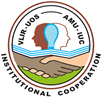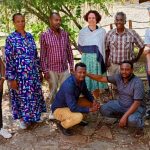Arba Minch University-Inter-University Cooperation Program Project III (P3) has conducted research dissemination and gap identification workshop on maternal and child health on April 19, 2023. Click here to see more pictures.
AMU-IUC Program Manager Dr. Fasil Eshetu remarked that AMU-IUC program has 6 specific projects including Project III (P3) that focuses on enhancing maternal and child health. According to Dr. Fassil, quality research with reliable and factual data has an instrumental role to bring real societal change; such kinds of gatherings with the community and concerned bodies are also helpful to validate and disseminate research findings and identify other areas to be researched.
Among the promoters of the project, Professor Yves Jacquemyn from University of Antwerp, Belgium, said that maternal mortality is a serious public health concern with a shocking impact on children, families, and communities worldwide. Despite significant efforts made with limited resources and enormous research publications done in the area, maternal mortality remains high in developing countries. According to the professor, such research workshops with community and stakeholders are vital in reshaping the way to approach and conduct quality research that significantly brings sustainable change in the area and serves the community’s interest.
Mr. Wanzahun Godana, a PhD Candidate at University of Antwerp and P3 leader in his part said, the project works focusing on improving maternal and child health in southern rift valley with five sub projects giving special attention on malaria, maternal nutrition, Cutaneous leishmaniasis, improvement of Maternal Waiting Homes (MWHs), and improving students’ knowledge and recalling efficiency through providing iron and Vitamin A. He also added that within the project, five AMU staff members got PhD chances in the first phase and so did the other four staff memebers in the second phase which plays pivotal role for CMHS staff profile development. The workshop was organized to evaluate and disseminate the research conducted on maternal and child healthcare and to gather ideas from the community and health sector experts to shape the research project to be conducted in the second phase, he noted.
Mrs Mekedes Kondale, a PhD Candidate at University of Antwerp, Belgium, presenting her study result on “Implementation of Safe Motherhood Promotion: A focus on three-delays” said that dalliances on deciding to seek for care, identifying and reaching to the medical facility and receiving adequate and appropriate service at health facility are the three delays causing maternal mortality. According to her findings of the study, which was conducted at nine Kebles of Arba Minch Zuria Woreda, mothers’ choice to be treated by traditional birth attendants, fear of medical intervention, problems related with transportation and cost, low maternal health service utilization compared with the recommended standards, and absence or poor service delivery of Maternity Waiting Homes (MWHs) are the main factors to the three delays highly contributing for maternal mortality, she explained.
To improve maternal health service utilization and reduce maternal mortality, working on women’s empowerment, improving access to health care services particularly in highland areas, serving mothers based on patient centered approach, enhancing service delivery of Maternity Waiting Homes (MWHs) are mandatory, Mrs Mekedes recommended.
Mrs Hanan Abdulkadir, a PhD Candidate at University of Antwerp, Belgium, presenting her survey study on “Assessing Basic Emergency Obstetric Care (BEmOC) Service Availability and Readiness among Health Facilities of Gamo Zone, Southern Ethiopia”, tried to assess the basic emergency obstetric care service availability and readiness among 33 health facilities (Health Centers and Hospitals) of Gamo Zone. The survey result revealed that only two health facilities had full 22 tracing items and the mean facility readiness to give BEmOC signal functions in the health facilities in the study area is 80.2%. On the other hand, in 18.18% health facilities BEmOC is fully operational; and on the rest 81.81% health facilities it is fully functional, she stated.
Officials and experts from SNNPR Health Bureau, Woreda Health Offices, Maternal Healthcare Facilitators, representatives from the community, academic and research staff from AMU, project promoters and supervisors were in attendance.
Arba Minch University
The Center of Bright Future!
Communication Affairs Directorate



